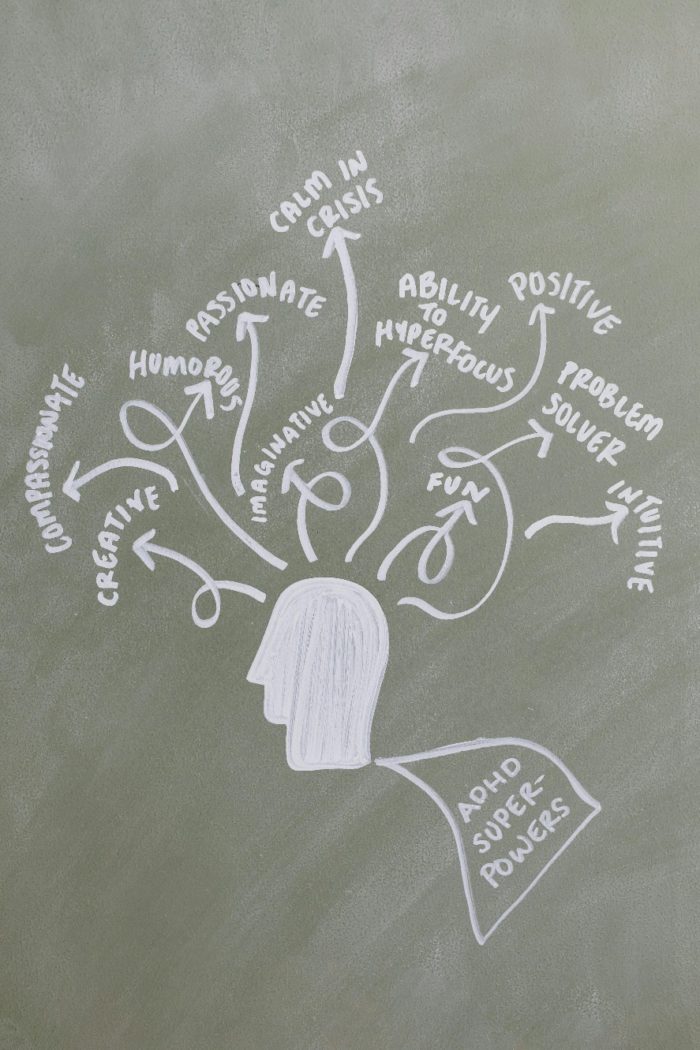Embracing ADHD and Perimenopause: My Journey to Becoming a Better Complementary Therapist and Tutor
Whilst many people still associate ADHD with children and more commonly males, there has been an explosion in older adults coming forward as neurodivergent –especially females who are tend to be underdiagnosed as a group. Here, TTH tutor Lisa Pankhurst reveals her story of finding the ‘gold’ in ADHD through the additionally lens of perimeopause.
In life, we often encounter challenges that seem insurmountable at first glance. For me, two significant revelations reshaped my professional and personal journey: discovering I had ADHD and entering perimenopause. These dual realisations not only changed how I perceive myself but also profoundly impacted my approach as a complementary therapist and tutor. This is my story of growth, understanding, and empowerment.

The Awakening: Realising ADHD
For years, I navigated life feeling somewhat out of sync. I was constantly grappling with an overwhelming influx of thoughts, a relentless restlessness, and a propensity for hyperfocus on tasks that piqued my interest. Yet, I struggled with everyday routines and often felt misunderstood and disorganized. It wasn’t until the early stages of perimenopause that I began to seek answers.
Perimenopause brought about a slew of changes—mood swings, memory lapses,
and physical discomforts that were difficult to ignore. Amidst these changes, I
found myself diving into research, seeking to understand what was happening to
my body and mind. This journey led me to a diagnosis that explained so much of
my lifelong experiences: ADHD.
Understanding ADHD
Attention Deficit Hyperactivity Disorder (ADHD) is often associated with hyperactive children, but it affects adults too, particularly women, who are frequently underdiagnosed. ADHD manifests in various ways, including difficulty in maintaining attention, impulsivity, and hyperactivity. For women, hormonal changes can exacerbate these symptoms, making them more pronounced during perimenopause.
The Intersection of ADHD and Perimenopause
Perimenopause is a transitional period leading up to menopause, characterized by hormonal fluctuations that affect both physical and mental health. For someone with ADHD, these hormonal changes can amplify symptoms, leading to increased anxiety, depression, and cognitive difficulties.
For me, the intersection of ADHD and perimenopause was both a revelation and a challenge. Understanding this helped me piece together my experiences and equipped me with the tools to manage my symptoms more effectively. I began to see my ADHD not as a limitation but as a unique way my brain processes the world, offering both strengths and challenges.
Transforming My Practice as a Complementary Therapist
Image by Tara Winstead from Pexels

As a complementary therapist, my role is to provide holistic care, addressing the physical, emotional, and spiritual needs of my clients. Realising I had ADHD allowed me to harness my unique traits to enhance my practice in several ways:
- Empathy and Understanding: With ADHD, I experience a heightened sense of empathy. I understand the struggles of feeling overwhelmed and misunderstood, which allows me to connect deeply with clients facing their own challenges. This empathy has become a cornerstone of my therapeutic approach.
- Hyperfocus for Deep Learning: One of the benefits of ADHD is the ability to hyperfocus on subjects of interest. I utilised this trait to deepen my knowledge in various therapeutic modalities, continuously expanding my skill set to offer more comprehensive care to my clients.
3. Creativity and Innovation: ADHD often brings a high level of creativity. I leveraged this creativity to develop innovative treatment plans tailored to individual client needs, combining traditional and alternative therapies in unique ways to enhance healing.
4. Energy and Passion: The boundless energy that comes with ADHD translates into passion for my work. I channel this energy into each session, ensuring that my clients feel supported and motivated in their healing journeys.
5. Flexible and Adaptive Approach: ADHD has taught me to be adaptable and flexible. I can easily adjust my methods to suit the changing needs of my clients, ensuring they receive the most effective and personalized care.
Becoming a Better Tutor
In addition to my work as a therapist, I am also a tutor, guiding students in their own journeys to become complementary therapists. Realizing I had ADHD profoundly impacted my teaching methods, making me a more effective and compassionate educator.
- Enhanced Patience and Support: Understanding the struggles associated with ADHD, I approach my students with greater patience and support. I recognize that each student learns differently and tailor my teaching methods to accommodate diverse learning styles.
- Structured and Organized Teaching: To manage my ADHD symptoms, I developed strategies for organization and time management. These strategies have become integral to my teaching, helping students stay organized and focused, which is particularly beneficial for those who may also have ADHD or other learning challenges.
- Interactive and Engaging Lessons: Leveraging my creativity, I design interactive and engaging lessons that keep students interested and motivated. I incorporate various teaching aids, practical demonstrations, and real-life examples to make learning dynamic and enjoyable.
- Creating a Safe Learning Environment: My own experiences with ADHD have taught me the importance of a supportive and non-judgmental environment. I strive to create a classroom atmosphere where students feel safe to express themselves, ask questions, and make mistakes as part of their learning process.
- Fostering Self-Awareness and Self-Care: I emphasize the importance of self-awareness and self-care in both personal and professional development. By sharing my journey with ADHD and perimenopause, I encourage students to be mindful of their own needs and to prioritize their well-being.
The Benefits of Spiritual Progression
Through my journey, I have come to appreciate the profound impact of spiritual progression. Integrating spiritual practices into my life and work has been transformative, providing a deeper sense of purpose and connection.
- Holistic Healing; Spiritual practices such as
meditation, energy healing, and mindfulness have enhanced my ability to provide
holistic care. These practices promote healing on all levels—physical,
emotional, mental, and spiritual.
- Personal Growth: Engaging in spiritual
progression has fostered my own personal growth. It has helped me navigate the
challenges of ADHD and perimenopause with grace and resilience, allowing me to
grow as both a therapist and a tutor.
- Empowering Clients and Students: By incorporating spiritual teachings into my practice and curriculum, I empower clients and students to explore their own spiritual journeys. This exploration often leads to profound insights and a greater sense of purpose and fulfilment.
Who Are You Really?
This journey has prompted me to ask fundamental questions about identity and purpose. Who am I, really? Beyond the labels of therapist, tutor, woman, or individual with ADHD, I am a spiritual being having a human experience. This realization has been liberating, allowing me to embrace my true self and live authentically.
In discovering my true self, I have also recognized the importance of helping others on their journeys of self-discovery. Whether through therapy or teaching, my goal is to guide others in uncovering their true potential and living fulfilling lives.
Discovering There’s Much More to Life
Realising I had ADHD and entering perimenopause were pivotal moments that opened my eyes to the richness of life. These experiences have shown me that life is not just about managing symptoms or overcoming challenges, but about embracing the journey with all its complexities.
There is so much more to life than we often realize. By opening ourselves to new perspectives and exploring the depths of our being, we can discover a world of possibilities. This journey is not always easy, but it is profoundly rewarding.
Conclusion
Embracing ADHD and navigating perimenopause have been transformative experiences that have made me a better complementary therapist and tutor. These challenges have deepened my empathy, creativity, and adaptability, allowing me to connect more meaningfully with clients and students.
As I continue on this journey, I remain committed to personal and professional growth, driven by a passion for holistic healing and spiritual progression. Through my work, I hope to inspire others to embrace their own journeys, discovering the infinite potential within and the boundless possibilities that life offers.
Email: hello@lisajhealing.co.uk
Web: https://lisajhealing.co.uk/
Tel: 07535485082